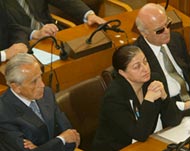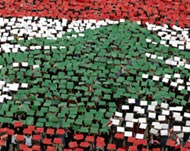Lebanon marks civil war anniversary
Lebanon has marked the 30th anniversary of the start of the 1975-1990 civil war as it suffers its worst political crisis in years.

As a symbol of unity between Lebanon’s 17 religious sects, Beirut church bells sounded in unison with mosques’ call to prayer at midnight on Tuesday.
The war began on 13 April 1975 after right-wing Christian militiamen ambushed a bus and killed 27 Palestinians.
The attack sparked street fighting and sectarian massacres resulting in the gradual loss of government control over the country.
Over the past week, events held in Beirut have commemorated the beginning of the war which killed more than 100,000 people and tore the country apart.
Joy not chaos
The National Unity Festival included a fun run, concerts and other activities aimed at bringing Lebanese from across the religious and political spectrum together.
 |
|
Bahia al-Hariri (C) called on all |
“We call on Lebanese of all religions and all regions to take part in these activities,” assassinated former prime minister Rafiq al-Hariri’s sister, MP Bahia al-Hariri, said.
“We want to show them that our will for life cannot be defeated. We want our streets and our squares to be filled with joy and people and not left abandoned for chaos,” she said.
The assassination of al-Hariri and the withdrawal of the Syrian military under pressure from the US and UN, has plunged the country into the worst crisis since the end of the civil war.
Lebanon has been without a government since demonstrators forced out prime minister Umar Karami’s cabinet from power at the end of February.
Violence fears
The anniversary has extra resonance at a time when some in Lebanon fear the crisis could spark violence similar to that of the civil war.
 |
|
Many say the recent protests |
One of the organisers of the events, opposition leader Walid Jumblatt’s wife, Nura Jumblatt, said she hoped the event would remind Lebanese of the importance of coexistence.
“It’s for the young generation, and to remind them that they shouldn’t make the same mistakes as us,” she told Aljazeera.net.
Jumblatt said the protests that followed al-Hariri’s assassination brought Lebanese together and she hoped the festival would expand on this.
“I think they are accepting each other much better. I think they are expecting the differences in Lebanese society,” she said.
Historical amnesia?
Commemorating the civil war is a sensitive subject. Some critics say Lebanese society suffers from historical amnesia and is unwilling to remember the conflict.
Monuments marking the war are rare, and to date there is no standard version of the conflict in Lebanese school books.
|
“I think that people can go back and look at the war without fear” Political analyst Paul Salim |
Lebanese political analyst Paul Salim says many did not want to commemorate the war, but recent events have changed that.
“It is complex. Maybe the intellectuals should have done much more,” Salim told Aljazeera.net.
“First of all, the population, when it first emerged from the war, it certainly wasn’t eager to remember the war. But you can’t really blame them for not wanting to go back to relive the horrors,” he said.
Salim said al-Hariri’s assassination and the subsequent street protests had reconciled some differences in Lebanese national identity.
“I think now people can go back and look at the war without fear. People really feel that they are together now,” he said.